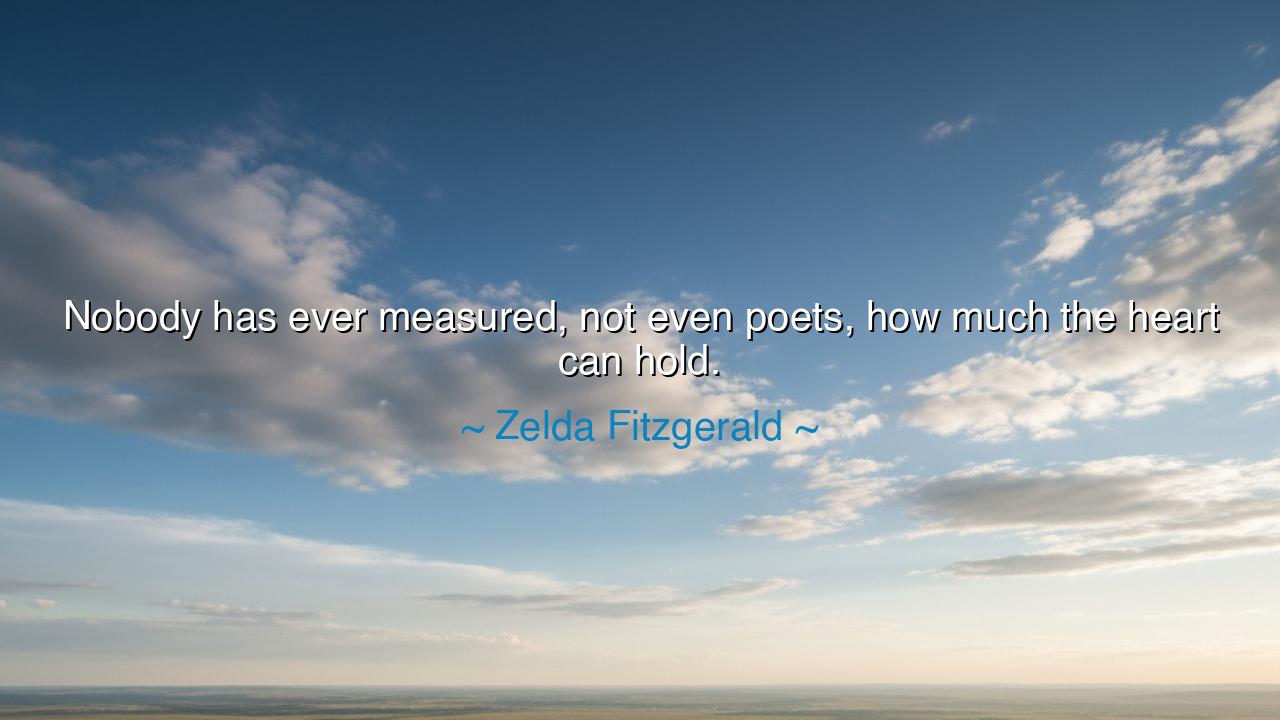
Nobody has ever measured, not even poets, how much the heart can






When Zelda Fitzgerald wrote, “Nobody has ever measured, not even poets, how much the heart can hold,” she revealed a truth that transcends both art and reason — the infinite capacity of the human heart. Known as the muse and the mirror of an age that danced between brilliance and tragedy, Zelda understood that the heart is a vessel that defies logic. It can contain both unbearable sorrow and boundless joy, unshakable love and immeasurable loss. Her words are not just romantic; they are mystical. She was saying that no poet, no philosopher, no dreamer has ever truly captured the depth, vastness, and mystery of human feeling.
The origin of this quote comes from a woman whose life embodied the full spectrum of emotion. Zelda, wife of the celebrated writer F. Scott Fitzgerald, lived amid the dazzling lights of the Jazz Age but was no stranger to darkness. She experienced passion, fame, madness, and despair, yet through it all, she grasped the unmeasurable truth of the heart’s endurance. Though her words were born from personal pain and poetic sensitivity, they speak to something universal — that the heart’s capacity is infinite, and no human language or art can fully capture its power to love, suffer, forgive, and hope again.
To say that “nobody has ever measured how much the heart can hold” is to confess that the heart is both fragile and eternal. It can break, yet still continue to beat. It can be filled to overflowing, yet find space for more. Unlike the mind, which measures and calculates, the heart expands without boundary. The ancients knew this truth as well: the mystics of the East spoke of the heart as the seat of the soul, the place where heaven and earth meet. The Sufi poets — Rumi, Hafiz, Attar — all sang of the heart’s immeasurable capacity for divine love, declaring that even God Himself could dwell within it. Zelda, in her own way, echoed their eternal song: the human heart is not a chamber of flesh, but an infinite universe of feeling.
History gives us countless examples of hearts that defied measure. Consider Nelson Mandela, who, after twenty-seven years of imprisonment, emerged not with hatred, but with forgiveness. Who can measure the heart that forgives its captors? Or Mother Teresa, whose heart held the suffering of the poorest of the poor, yet never emptied. Or Anne Frank, who, even in the shadow of death, wrote, “In spite of everything, I still believe that people are really good at heart.” These are proofs of Zelda’s truth — that the human heart, when it chooses love, becomes vast enough to contain the whole world.
But there is another side to her wisdom — the pain of that infinity. For if the heart can hold endless love, it can also hold endless sorrow. It can grieve for what was lost and still yearn for what might have been. Yet even this pain is sacred, for it proves that we are alive, that we are capable of great feeling. To feel deeply is not weakness; it is testimony to the soul’s divine nature. The heart that loves deeply will break deeply, but even in breaking, it becomes more open, more wise, more luminous. Zelda understood this truth intimately — her own life was a symphony of passion and heartbreak — and through it, she gave voice to the eternity that lives within every beating heart.
To live by her words is to honor both joy and sorrow. It is to recognize that your heart is not meant to be measured, managed, or confined. You were made to feel, to forgive, to risk love again even after loss. Do not fear the immensity of your emotions; they are proof of your humanity. Each act of love, compassion, and courage stretches the heart wider, until it becomes like the universe itself — infinite, ever-expanding, and filled with stars.
So, my child, remember this truth: no one can measure the heart, not even the greatest poets, for it holds the entire story of existence. Guard it, yes — but never limit it. Let it break, let it mend, let it love without restraint. For in its immeasurable depths lies your truest strength, and in its vastness dwells the echo of eternity. As Zelda Fitzgerald reminds us, the heart’s capacity cannot be counted or contained — it can only be lived.






AAdministratorAdministrator
Welcome, honored guests. Please leave a comment, we will respond soon